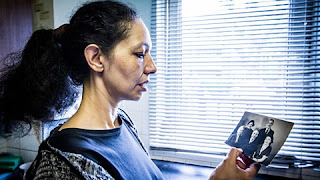This article was originally published in The Courier on 22nd September 2018.
KILLING EVE: Saturday, BBC One
MONKMAN AND SEAGULL’S
GENIUS GUIDE TO BRITAIN: Monday, BBC Two
One
of the best new TV shows of 2018, KILLING
EVE is an addictive eight-part comedy-drama that subverts typical spy
thriller tropes with offbeat panache. It debuted on BBC America earlier this
year, and was instantly met with a barrage of glowing reviews and an eventual
brace of award nominations. I’m not surprised.
It’s
based on a series of novellas by Luke Jennings and adapted by Phoebe
Waller-Bridge, author and star of the justly acclaimed BBC sitcom Fleabag. Similar to Waller-Bridge’s
previous work in that it switches effortlessly on a dime between dry, caustic
comedy and visceral drama, Killing Eve is witty, knowing and stylish, but never
feels pleased with itself.
Eve
Polastri (a tremendously likeable performance from Asian-Canadian actor Sandra
Oh) is a bored, deskbound MI5 security officer who becomes obsessed with
tracking down a female assassin at large in Europe. Unfortunately, that’s not
part of her job. She’s basically a pen-pusher.
However,
in episode one, her perceptive handling of a technically illegal investigation managed
to impress a female senior officer. Eve, a woman in her late forties, is on the
verge of fulfilling her dream of becoming a bona fide secret agent.
She
isn’t a kick-ass action hero, she’s a normal, relatable human being. She’s
happily married and gets on with her boss (the great David Haig on droll form).
A quietly subversive creation, Eve is a refreshing antidote to all those tiresomely
troubled male crime-busters who usually populate our screens.
The
expert assassin, Villanelle, is also unusual. Perfectly played by Jodie Comer
as a sort of casually spoiled student on a murderous gap year, she’s a darkly
amusing parody of psychopathic villainy. Whenever this beautiful young Russian isn’t
gleefully murdering Mafia bosses by stabbing them through the eye with a
customised hairpin, she’s tipping ice cream over sweet little girls and
refusing to help old ladies with their heavy bags. She may be a homicidal
maniac, but Villanelle is a fun character to be around.
The
plot is triggered when she assassinates a Russian diplomat in Vienna. Eve is
tasked with looking after the sole witness, a drug-addled Polish woman whose
incoherent babble may hold the key to the killer’s identity. Eve asks her genial
Polish husband to translate these ramblings (a convenient coincidence, but I’ll
let it pass). An obscure Polish slang word for “flat-chested” confirms Eve’s
suspicions that the killer is a woman. And the game is on.
Despite
featuring several recognisable staples of the spy genre – e.g. various
glamorous European locations – Killing
Eve feels fresh. Oh and Comer make for an arresting pair of antagonists;
you somehow find yourself wanting both of them to prevail. A controlled explosion of pulp hokum, it’s a genuinely
funny and surprising affair.
From
the sublime to, well, two popular University
Challenge contestants driving around the UK. In MONKMAN AND SEAGULL’S GENIUS GUIDE TO BRITAIN, best friends Eric
Monkman and Bobby Seagull hit the road in search of various examples of British
ingenuity.
Richly
narrated by Simon Callow, it’s a harmlessly generic travelogue in which our
big-brained hosts engage in amusingly esoteric conversation while visiting destinations
such as Jodrell Bank, a ginormous broadcasting mast, and a lawnmower museum
(where they were delighted to discover a mower that once belonged to Brian
May). Naturally, they provide interesting nuggets of learned information along
the way.
They’re
a likeable pair, but Monkman in particular is a TV natural. A nerdy Canadian
with a Cheshire Cat grin and a head seemingly crammed with all knowledge, he’s
possibly on his way to becoming an eccentric national treasure.


















